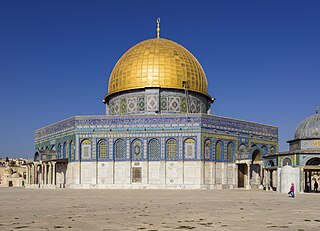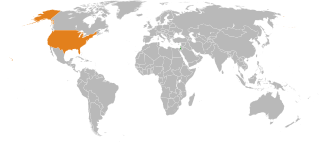
The Israeli–Palestinian conflict is an ongoing military and political conflict about land and self-determination within the territory of the former Mandatory Palestine. Key aspects of the conflict include the Israeli occupation of the West Bank and Gaza Strip, the status of Jerusalem, Israeli settlements, borders, security, water rights, the permit regime, Palestinian freedom of movement, and the Palestinian right of return.

United Nations Security Council Resolution 242 (S/RES/242) was adopted unanimously by the UN Security Council on November 22, 1967, in the aftermath of the Six-Day War. It was adopted under Chapter VI of the UN Charter. The resolution was sponsored by British ambassador Lord Caradon and was one of five drafts under consideration.

The history of the State of Palestine describes the creation and evolution of the State of Palestine in the West Bank and Gaza Strip. During the Mandatory period, numerous plans of partition of Palestine were proposed but without the agreement of all parties. In 1947, the United Nations Partition Plan for Palestine was voted for. The leaders of the Jewish Agency for Palestine accepted parts of the plan, while Arab leaders refused it. This triggered the 1947–1949 Palestine war and led, in 1948, to the establishment of the state of Israel on a part of Mandate Palestine as the Mandate came to an end.

The Camp David Accords were a pair of political agreements signed by Egyptian President Anwar Sadat and Israeli Prime Minister Menachem Begin on 17 September 1978, following twelve days of secret negotiations at Camp David, the country retreat of the President of the United States in Maryland. The two framework agreements were signed at the White House and were witnessed by President Jimmy Carter. The second of these frameworks led directly to the 1979 Egypt–Israel peace treaty. Due to the agreement, Sadat and Begin received the shared 1978 Nobel Peace Prize. The first framework, which dealt with the Palestinian territories, was written without participation of the Palestinians and was condemned by the United Nations.

Intermittent discussions are held by various parties and proposals put forward in an attempt to resolve the ongoing Israeli–Palestinian conflict through a peace process. Since the 1970s, there has been a parallel effort made to find terms upon which peace can be agreed to in both the Arab–Israeli conflict and in the Palestinian–Israeli conflict. Notably the Camp David Accords between Egypt and Israel, which included discussions on plans for "Palestinian autonomy", but did not include any Palestinian representatives. The autonomy plan would not be implemented, but its stipulations would to a large extent be represented in the Oslo Accords.
The Arab League was formed in Cairo on 22 March 1945 with six members: Egypt, Iraq, Transjordan, Lebanon, Saudi Arabia, and Syria. Yemen joined on 5 May 1945. Since its formation the Arab League has promoted the Palestinian Arab cause in the Israeli–Palestinian conflict, including by imposing the Arab League boycott of Israel. The Arab League opposed the United Nations Partition Plan for Palestine in 1947. On 15 May 1948, the then seven Arab League members coordinated an invasion of what was by then the former British Mandate, marking the start of the 1948 Arab–Israeli War.
The Rogers Plan was a framework proposed by United States Secretary of State William P. Rogers to achieve an end to belligerence in the Arab–Israeli conflict following the Six-Day War and the continuing War of Attrition.
The Jarring Mission refers to efforts undertaken by Gunnar Jarring to achieve a peaceful settlement of the conflict between Israel and its Arab neighbors after the Six-Day War in 1967.

The United States of America was the first country to recognize the nascent State of Israel. Since the 1960s, the American Israeli relationship has grown into a mutually beneficial alliance in economic, strategic and military aspects. The United States has provided strong support for Israel. It has played a key role in the promotion of good relations between Israel and its neighbouring Arab states—notably Jordan, Lebanon, Egypt—while holding off hostility from countries such as Syria and Iran. In turn, Israel provides a strategic American foothold in the region as well as intelligence and advanced technological partnerships in both the civilian and military worlds. During the Cold War, Israel was a vital counterweight to Soviet influence in the region. Relations with Israel are an important factor in the U.S. government's overall foreign policy in the Middle East, and the U.S. Congress has placed considerable importance on the maintenance of a supportive relationship.
The Arab–Israeli conflict began in the 20th century, evolving from earlier Intercommunal violence in Mandatory Palestine. The conflict became a major international issue with the birth of Israel in 1948. The Arab–Israeli conflict has resulted in at least five major wars and a number of minor conflicts. It has also been the source of two major Palestinian uprisings (intifadas).

Edward S. Walker Jr. is a former U.S. Ambassador to Israel, Egypt, and the UAE and is a Middle East specialist.

The Arab Peace Initiative, also known as the Saudi Initiative, is a 10 sentence proposal for an end to the Arab–Israeli conflict that was endorsed by the Arab League in 2002 at the Beirut Summit and re-endorsed at the 2007 and at the 2017 Arab League summits. The initiative offers normalisation of relations by the Arab world with Israel, in return for a full withdrawal by Israel from the occupied territories, with the possibility of comparable and mutual agreed minor swaps of the land between Israel and Palestine, a "just settlement" of the Palestinian refugee problem based on UN Resolution 194, and the establishment of a Palestinian state with East Jerusalem as its capital. A Palestinian attack called the Passover massacre took place on 27 March 2002, the day before the Initiative was published, which initially overshadowed it.

The Arab–Israeli conflict is the phenomenon involving political tension, military conflicts, and other disputes between various Arab countries and Israel, which escalated during the 20th century. The roots of the Arab–Israeli conflict have been attributed to the support by Arab League member countries for the Palestinians, a fellow League member, in the ongoing Israeli–Palestinian conflict; this in turn has been attributed to the simultaneous rise of Zionism and Arab nationalism towards the end of the 19th century, though the two national movements had not clashed until the 1920s.

Aaron David Miller is an American Middle East analyst, author, and negotiator. He is a senior fellow at the Carnegie Endowment for International Peace, focusing on U.S. foreign policy. He previously was vice president for new initiatives at the Woodrow Wilson International Center for Scholars, and has been an advisor to both Republican and Democratic secretaries of state. He is a Global Affairs Analyst for CNN.

Israel–Jordan relations are the diplomatic, economic and cultural relations between Israel and Jordan. The two countries share a land border, with three border crossings: Yitzhak Rabin/Wadi Araba Crossing, Jordan River Crossing and the Allenby/King Hussein Bridge Crossing, that connects the West Bank with Jordan. The relationship between the two countries is regulated by the Israel–Jordan peace treaty in 1994, which formally ended the state of war that had existed between the two countries since the establishment of the State of Israel in 1948, and also established diplomatic relations, besides other matters. Relations between the countries get strained from time to time, usually over tensions at the Al-Aqsa mosque. On 8 October 2020, Israel and Jordan reached an agreement to allow flights to cross over both countries’ airspace.

Andreas Reinicke is a German diplomat and currently the German Ambassador to Tunisia. He has been the European Union Special Representative for the Middle East Peace Process. Alberto Oggero, an Italian diplomat, served as his deputy until 31 December 2013. Reinicke was appointed by the Council of the European Union on 23 January 2012, and his mandate was repealed on 1 January 2014, following proposals to the Political and Security Committee (PSC) by High Representative of EU for Common Foreign Affairs and Security Policy, Catherine Ashton.

The two-state solution to the Israeli–Palestinian conflict proposes to resolve the conflict by establishing two nation states in former Mandatory Palestine. The implementation of a two-state solution would involve the establishment of an independent State of Palestine alongside the State of Israel. The two-state solution is widely supported in the international community, as well as by the Palestinian Authority; however, Israel rejects the creation of a Palestinian state.

The Madrid Conference of 1991 was a peace conference, held from 30 October to 1 November 1991 in Madrid, hosted by Spain and co-sponsored by the United States and the Soviet Union. It was an attempt by the international community to revive the Israeli–Palestinian peace process through negotiations, involving Israel and the Palestinians as well as Arab countries, including Jordan, Lebanon and Syria.

The Trump peace plan, officially titled "Peace to Prosperity: A Vision to Improve the Lives of the Palestinian and Israeli People", was a proposal by the Trump administration to resolve the Israeli–Palestinian conflict. President Donald Trump formally unveiled the plan in a White House press conference alongside Israeli Prime Minister Benjamin Netanyahu on 28 January 2020. The plan had been delayed by two years and previously rejected by the Palestinians, who were not invited to the meeting.

The Israel–United Arab Emirates normalization agreement, officially the Abraham Accords Peace Agreement: Treaty of Peace, Diplomatic Relations and Full Normalization Between the United Arab Emirates and the State of Israel, was initially agreed to in a joint statement by the United States, Israel and the United Arab Emirates on August 13, 2020, officially referred to as the Abraham Accords. The UAE thus became the third Arab country, after Egypt in 1979 and Jordan in 1994, to agree to formally normalize its relationship with Israel, as well as the first Persian Gulf country to do so. Concurrently, Israel agreed to suspend plans for annexing parts of the West Bank. The agreement normalized what had long been informal but robust foreign relations between the two countries. The agreement was signed at the White House on September 15, 2020. It was approved unanimously by the Israeli cabinet on October 12 and was ratified by the Knesset on October 15. The UAE parliament and cabinet ratified the agreement on October 19. The agreement went into effect on January 5, 2021.













